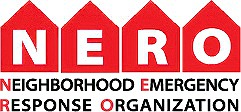Neighborhood Emergency Response Organizations (NEROs)
 NERO: We’re All in This Together
NERO: We’re All in This Together
Neighbors Helping Neighbors: that’s the catchphrase for VashonBePrepared, and it’s the concept behind Neighborhood Emergency Response Organizations (NEROs).
What’s a NERO?
It’s an informal group of about five to fifteen households, who collaborate to help each other prepare, and to support each other when things go wrong. The goal: help each other stay comfortable and safe after a winter storm, power outage, earthquake or other emergency. Meeting at least once a year, NERO groups may share skills and resources, to help everyone shelter in place until a storm passes. On Vashon-Maury, there are over 270 NERO groups already organized!
Why Form a NERO?
Some of us may have only electric heat, or have very young children or elders at home, or need help getting critical medicines. Others may have the skills to remove a downed tree across the road, or transport someone to the clinic, or share a meal. By checking on the well-being of neighbors, NERO participants can also speed up the reporting of injuries, property damage, and problems with roads and utilities, so that our professional emergency responders can act more efficiently – and more quickly – to save lives and preserve property. (Of course, anyone who needs urgent help should call 9-1-1).
How Do We Get Started?
Talk with a few of your neighbors about meeting up to help each other get more prepared. For more help, send an email to the NERO Coordinator at NERO@VashonBePrepared.org. Your group can schedule a brief presentation for lots of tips on how to band together to be more prepared.

Rick Wallace leading a NERO meeting (photo: Eric Perlman)
